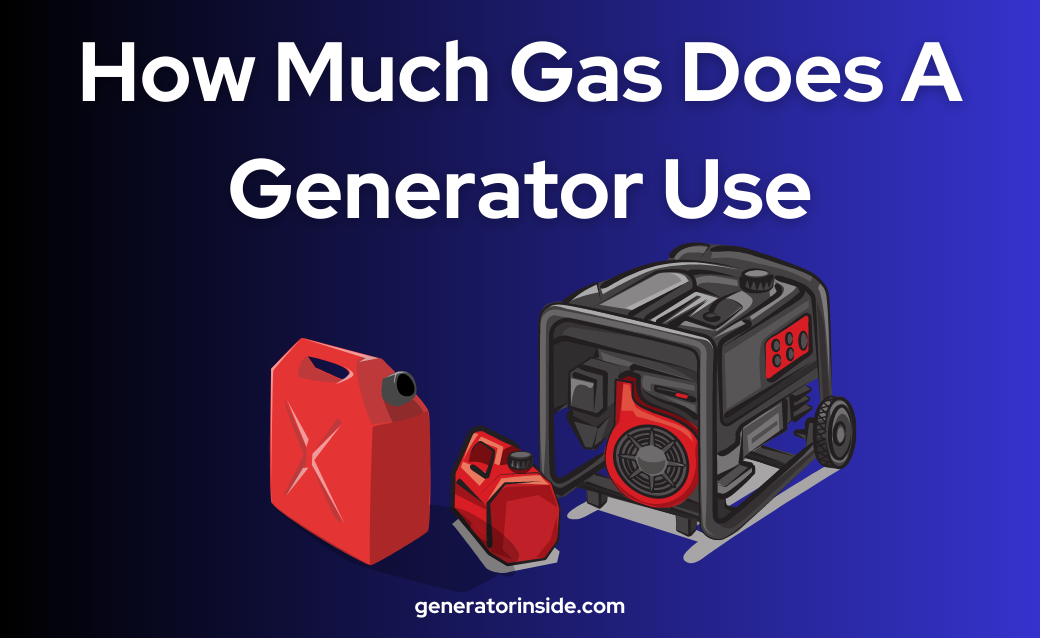
Generators are a great backup option to have in case of a power outage or when you’re away from traditional power sources. But one question that often arises is how much gas does a generator use? The answer to this question depends on different factors.
how much gas does a generator use The Size and Type of the Generator
This will play a large role in determining how much gas it uses. For example, a small portable generator that is designed to power a few appliances during a power outage will use significantly less gas than a larger, whole-house generator that can power an entire home.
The type of fuel
The type of fuel generator uses can also affect its fuel consumption. For example, diesel generators are typically more fuel-efficient than gasoline generators, but they can be more expensive to purchase and maintain.
Load it’s Powering
A generator that is powering a few lights and a refrigerator will use significantly less gas than one that is powering a whole-house air conditioning system, a hot tub, and several large appliances. It’s important to consider the wattage of the appliances and devices you’ll be using with your generator and choose a generator with an appropriate output to avoid wasting fuel.
The Duration of Use
The duration of use is also an important consideration when it comes to gas consumption. A generator that is used for a few hours each day during a power outage will use significantly less gas than one that is used continuously for weeks or months. It’s important to monitor the amount of gas you’re using and keep a supply on hand in case of extended outages.
How to Calculate How Much Gas a Generator uses?
To calculate how much gas a generator has used, you can follow these steps:
- Determine the fuel tank capacity of your generator. This information is usually provided in the manufacturer’s specifications for your specific generator model.
- Note the starting fuel level in the generator’s fuel tank before you begin using it. You can use a dipstick or fuel gauge to measure this.
- Use the generator as needed and monitor the fuel level periodically.
- When you’re finished using the generator-note the ending fuel level.
- To calculate the amount of gas used, subtract the ending fuel level from the starting fuel level. This will give you the total amount of gas consumed during use.
- To convert this number to gallons, divide the total gas consumed by the number of liters in a gallon (3.785 liters per gallon).
Alternatively, if you have access to a fuel flow meter or a fuel consumption calculator, you can use these tools to estimate the amount of gas used by your generator. These tools typically require you to input information such as the generator’s fuel consumption rate, the duration of use, and the load being powered.
They can be a helpful way to get a more accurate estimate of gas consumption, particularly if you need to plan for extended periods of generator use.
What is The Rate of Fuel Consumption for a Generator Per Hour?
The rate of fuel consumption for a generator per hour can vary depending on the same factors mentioned initially. Typically, a small portable generator can consume between 0.5 to 1 gallon of gasoline per hour of operation, while larger whole-house generators can use 2 to 4 gallons of gasoline per hour or more, depending on the specific model and load. The rate of fuel consumption can also depend on the type of fuel the generator uses, such as diesel or propane.
What is The Most Suitable Type of Fuel for a Generator?
The most suitable type of fuel for a generator can depend on various factors, such as the specific generator model, availability of fuel sources, and intended usage. Some generators are designed to run on gasoline while others may be designed for diesel or propane. Each fuel type has its advantages and disadvantages.
- Gasoline
Gasoline is the most common type of fuel used in portable generators and is readily available at most gas stations. It’s also easy to store and transport. But gasoline has a relatively short shelf life and can degrade over time, making it less suitable for long-term storage.
- Diesel
Diesel is a more efficient fuel than gasoline and can provide longer run times for generators. It’s also less flammable and has a longer shelf life than gasoline. However, diesel generators are typically more expensive than gasoline generators and may require more maintenance.
- Propane
Propane is a clean-burning fuel that produces fewer emissions than gasoline or diesel. It also has an indefinite shelf life, making it a good choice for long-term storage. However, propane generators may have a lower power output compared to gasoline or diesel generators, and propane fuel can be more expensive and less readily available in some areas.
Ultimately, the most suitable type of fuel for a generator will depend on your specific needs and circumstances. It’s important to carefully consider the advantages and disadvantages of each fuel type and choose the one that best fits your requirements.
How Long will 5 Gallons of Gas Run a Generator?
To determine how long 5 gallons of gas will power a generator, you need to consider several factors. These include the generator’s fuel consumption rate, the amount of load it is powering, and the size of its fuel tank.
A small portable generator designed to power a few appliances during a power outage typically consumes between 0.5 to 1 gallon of gasoline per hour of operation. This means that 5 gallons of gas can provide anywhere from 5 to 10 hours of continuous operation.
Larger whole-house generators designed to power an entire home can consume significantly more fuel, typically between 2 to 4 gallons of gasoline per hour, depending on the load and the specific model. In this case, 5 gallons of gas may only provide 1 to 2.5 hours of continuous operation.
It’s important to note that fuel consumption rates can vary greatly between different generator models and brands, as well as between different types of fuel. Diesel generators, for example, tend to be more fuel-efficient than gasoline generators and can provide longer run times for the same amount of fuel.
The load being powered by the generator can have a significant impact on its fuel consumption rate. High-powered appliances such as air conditioners or electric stoves can cause the generator to consume more fuel than if it’s only powering smaller electronics like lights or a refrigerator.
Therefore, it’s crucial to carefully consider the specific circumstances when determining how long 5 gallons of gas will run a generator. By taking into account the generator’s fuel consumption rate, the load it will be powering, and the size of the fuel tank, you can estimate how long the generator will run and ensure efficient and safe operation.
Do Generators Use a lot of Fuel?
how much gas does a generator use? The fuel consumption of a generator is influenced by several factors, including the generator’s capacity, load requirements, and the type of fuel it uses as mentioned before. For instance, a 10,000-watt generator typically consumes approximately 0.88 gallons of diesel per hour. In contrast, a 15 kW diesel generator has a fuel consumption rate of around 1.2 gallons per hour, and a 20 kW unit operating at full capacity uses nearly 1.6 gallons per hour.
On the other hand, a gasoline generator with a five-gallon capacity is likely to consume at least 0.75 gallons per hour. Generally, generators with higher power output capacities will require more fuel compared to those with lower output levels.
How Often Should I Refuel My Generator?
The frequency of refueling your generator is contingent upon the duration of its usage. Generally, new generators require their initial oil change after approximately 25 hours of operation. Following this initial oil change, it is advisable to replace the oil every 50 to 60 hours of use.
In situations where power outages last for extended periods, it is possible that your generator may run long enough to necessitate an oil change. As such, it’s essential to monitor the generator’s operation time and ensure that proper maintenance is performed, including timely oil changes, to keep it functioning efficiently and prolong its lifespan.
How Many Watts Generators Do You Need to Power the Whole House?
The wattage required to power an entire house depends on the size of the home, the number of appliances and devices in use, and the homeowner’s specific energy needs. To determine the appropriate generator size, you need to calculate the total wattage of the appliances and devices that need to be powered during an outage.
Here’s a step-by-step process to estimate the generator size you need:
- Make a list of appliances and devices: List all the essential appliances and devices in your home that you want to power during an outage. Examples include the refrigerator, lights, heating or cooling systems, water pumps, computers, and televisions.
- Determine the wattage of each appliance: Check the appliance’s label or owner’s manual to find its wattage. If only the amperage is provided, you can calculate the wattage by multiplying the amperage by the voltage (usually 120V or 240V). For example, a 10-amp appliance running on 120V uses 1,200 watts (10A x 120V = 1,200W).
- Calculate the starting and running wattage: Appliances with motors, such as air conditioners, refrigerators, and pumps, require more power to start than to run continuously.
The starting wattage can be 2-3 times higher than the running wattage. Add up the running wattage of all the appliances, and then identify the appliance with the highest starting wattage. Add this starting wattage to the total running wattage to determine the minimum wattage your generator should have.
For example, if your total running wattage is 5,000W and your highest starting wattage is 3,000W, you will need a generator with a minimum capacity of 8,000W (5,000W + 3,000W).
- Consider power management options: Some modern generators come with power management systems that can help manage the power demands of your home more efficiently. This may allow you to use a smaller generator by cycling power between different appliances.
how much gas does a generator use Conclusion
In conclusion, determining the fuel consumption of a generator, the wattage needed to power an entire house, and the frequency of refueling and maintenance all depend on various factors, including the generator’s size, fuel type, and load requirements.
By carefully considering these factors and following the guidelines provided in this blog, you can make informed decisions about the generator that best suits your needs. Proper planning and maintenance will ensure that your generator operates efficiently and provides reliable backup power during outages or remote situations. Always consult with professionals when in doubt and remember that regular maintenance can prolong the life of your generator, providing you with peace of mind and security.
Also Read:
Why is my Generator Blowing White Smoke
How to Connect a Generator to a House Without Transfer Switch








